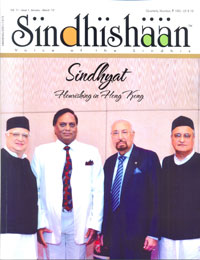REJOINDER

Dr. Ram Buxani’s apt and pertinent response to the Honorable Chief Minister of Gujarat, SHRI NARENDRA MODI’S address at the 18th International Sindhi Sammelan in Ahmedabad.
I keep hearing time and again at most Sindhi gatherings, the constant lament about the partition of Sindh which caused great upheaval to the Sindhi community. Let me stress here that Sindh was never partitioned. While it can be said that Punjab and Bengal were indeed partitioned in 1947, Sindh was literally annexed by what is now Pakistan. The term partition would have been appropriate if the state of Sindh would have been divided into two, with the Hindu dominant populated area becoming a part of India.
Another interesting aspect is that yet another partition occurred after 12 years when the Bombay state was split into Maharashtra and Gujarat. Now why did this happen? The Maharahtrians and Gujaratis strongly felt that they needed their own state to enable them to preserve their culture, heritage and language. The two communities felt that in the state of Bombay they were unable to maintain their identity and flourish. Does not the same yardstick apply to Sindhis?
To a large extent the blame for not being able to secure a state of our own lies squarely on our own attitude. In our quest for survival and success we lost sight of this basic need. I quote from one of the ghazals of Pankaj Udhas 'Tumne paisa bahut kamaya, is paise ne des chhudaya.' Our quest for financial gain has definitely lead us to the loss of our identity.
I remember in 1983, a Sindhi sammelan was organized by Bhagwandev Acharya, where luminaries like Indira Gandhi and Gyani Zial Singh were present. Indira Gandhi had stated that Hindu had been derived from Sindhu and from Hindu – Hindustan. “The whole of India is yours,” she had remarked, “why are you worrying so much.” This statement was met with a big round of applause and soon all dispersed and that was the end of our demand. I also remember that Gyani Zial Singh had said that we follow Guru Granth Sahib, but true service as preached in the Granth is done by your community. On hearing these words we felt very proud and happy – but what did we achieve?
For the promotion of Urdu the government grants `40 crores annually, and for the promotion of Marathi language ` 380 crores, and what do Sindhis get? ` 2 crores only. Look at the vast difference in the figures. Unfortunately we just get excited and carried away by hearing words like “the whole India is yours, the whole state belongs to you.”
In a democracy every individual has rights, unfortunatley we don't have political patronage, because Sindhis are basically a business community. However being a businessman in no way disqualifies a person from entering politics and there are several politicians who do have their own businesses. Moreover the few Sindhi politicians we do have at the national level work sincerely and earnestly for the country but give no thought to the community. If we have to preserve and maintain our identity and Sindhyat then this group (politicians) will have to be nurtured and promoted.
Yesterday when our brother Srichand Hinduja asked for a piece of land, where we Sindhis could reside and maintain our identity, you very well know the reply we got from the Honorable Chief Minister Shri Narendra Modi. I am sure no further discussions or followup action will be taken on this issue. We listen to lectures, applaud the speakers, enjoy the entertainment and the cuisine provided and then go back to our respective homes and lifestyle till we meet again after another year. All is forgotten and we fall back into our routine.
Actually, we do have a piece of land in Kandla, Gandhidham, where hundreds of acres of land was given to us, but we missed that opportunity and failed to develop it properly. Thirty years back when we used to go to Gandhidham we could see the sign boards everywhere in Sindhi, but today we don't get to see any boards in Sindhi. This is because the lifestyle, which Sindhis are used to, wasn't available over there. We have not given much thought to maintaining our identity. We talk a lot about Sindhyat and many a times it is asked, “but what does Sindhyat mean?” This morning in the kit which was distributed, there is a book by Satish Rohra 'Cultural Bypass Surgery'. I quote a paragraph from this book, “people ask what is Sindhyat? Just as by honesty we mean the honest behavior of the person or as deficiency means the deficient working of a man, similarly Sindhyat means the distinct features, qualities and behavior of a community by which it is recognized. Hence by Sindhyat we mean the peculiar lifestyle which makes Sindhis distinct from others. Our customs and our beliefs, faith and tradition, way of thinking and behavior which are quite different from other communities”.
And the next question is who is a Sindhi? Can the children who were born and brought up in India after partition and have never seen Sindh, be called Sindhis? And those who cannot speak, read or write Sindhi, should they be considered Sindhis? The simple answer to the above questions is YES. The essential criteria for calling someone Sindhi is not being born in Sindh or knowing the Sindhi language but recognizing oneself as Sindhi. Sindhi is our way of life, our customs and traditions, our thoughts and actions which are quite distinct from those of others.
We have to preserve Sindhyat and I am confident Sindhyat will definitely survive, But we have to work hard for it. Today the fact that so many delegates have gathered here from all over the world only goes to prove that they do have inherent love for Sindhyat and for preserving the Sindhi identity.


